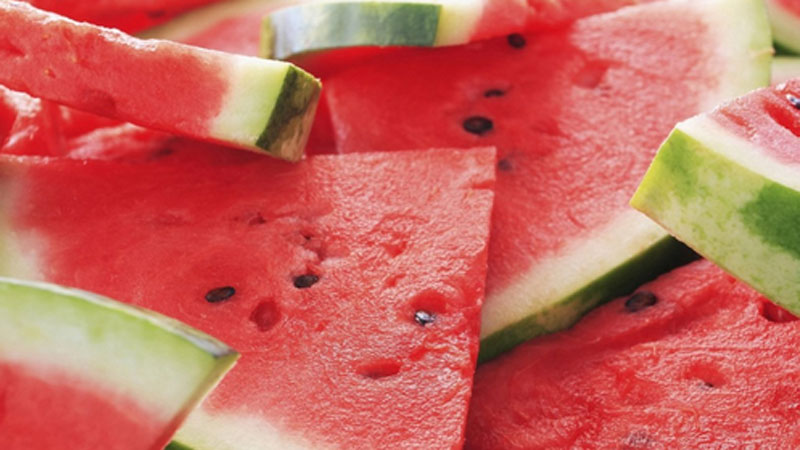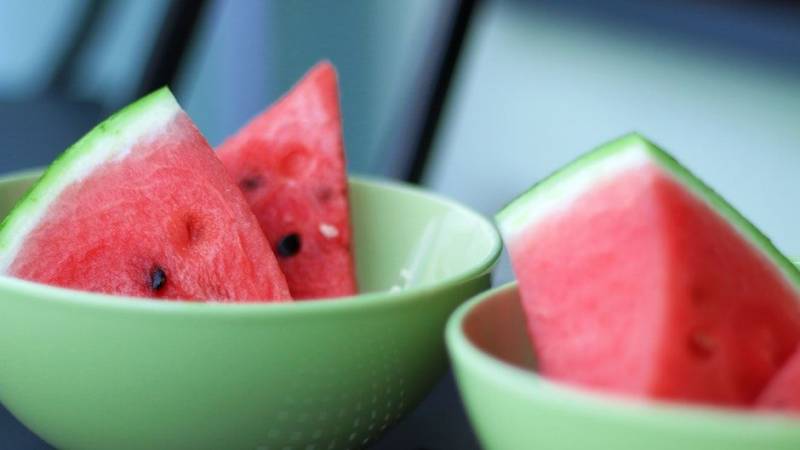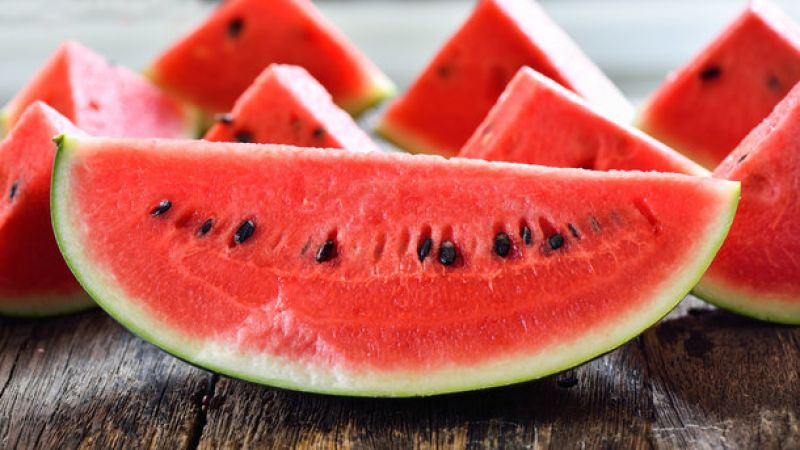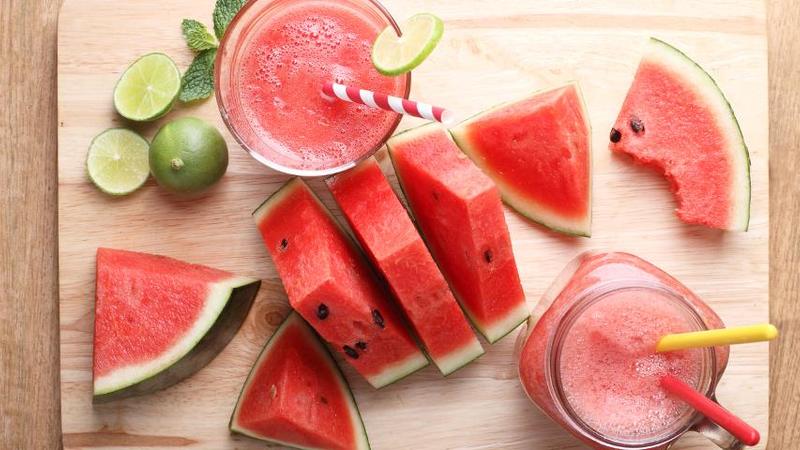Is it possible to eat watermelon on an empty stomach and in what cases problems may arise
Can you eat watermelon on an empty stomach? There is no consensus on this matter. Let us consider in detail all the arguments for and against, and at the same time we will study the composition and properties of the fruits of this melon culture, the harm and benefits for the body, the possibility of using watermelon on an empty stomach.
The content of the article
Composition and properties of watermelon
The fruit pulp of a watermelon contains 92.6% of water, from 5 to 13% of easily digestible carbohydrates (sucrose, fructose, glucose), 0.68% of pectin fibers, ash, organic acids, omega-3 and omega-6 fatty acids.
The composition of watermelon includes calcium, potassium, magnesium, sodium, phosphorus, iodine, sulfur, chlorine, zinc, fluorine, manganese, aluminum, boron, and other micro- and macroelements necessary to maintain biochemical and physiological processes of life.

Pulp and seed mature watermelon is used as a medicinal raw material, since they:
- have a diuretic and tonic effect;
- increase the peristalsis of the large intestine;
- reduce body temperature in case of fever;
- suppress the activity of the inflammatory process;
- activate liver function;
- increase the secretion of bile;
- normalize metabolism;
- activate blood circulation.
Calorie content and BZHU
100 g of fruit pulp contains 27 kcal, 0.7 g of protein, 0.1 g of fat, 5.8 g of carbohydrates.
Harm and benefit
Watermelon is a valuable food product that, if consumed frequently, provides the body to some extent vitamins, micro- and macroelements:
- Vitamin A (retinol) slows down the aging process, takes part in the formation of new cells, increases the protection of mucous membranes, serves as an antioxidant, and reduces the risk of atherosclerosis.
- Vitamin E supports the normal activity of the gonads, protects against the formation of free radicals, ensures the metabolism in the heart muscle.
- B vitamins: Thiamine is essential for the proper functioning of the heart, maintaining the health of the nervous and digestive systems; riboflavin provides oxidation processes, regenerates and restores body tissues, normalizes energy metabolism; choline serves as a good prevention of atherosclerosis, reduces changes in the brain in elderly people; pyridoxine is responsible for the metabolism of proteins and fats, the absorption of unsaturated fatty acids, and lowers cholesterol levels.
- Vitamin C (ascorbic acid) has a general strengthening effect on the walls of blood vessels, increases the elasticity and strength of small capillaries, participates in the formation of antimicrobial immunity.
- Calcium important for healthy bones and teeth, normal blood clotting.
- Potassium and magnesium improve the functioning of the heart and blood vessels, regulate the acid-base balance in the blood, make the skin elastic, maintain muscle tone.
- Aluminum affects reproductive capacity.
- Zinc participates in the synthesis of hormones.
- Iodine necessary for normal potency, increases resistance to various diseases.

Watermelon has a beneficial effect on vision, reduces muscle pain, removes toxins and toxins, and improves blood formation.
For reference... Nutritionists suggest overweight people to lose weight on a watermelon diet. 100 g of the edible portion contains 27 kcal, practically no fat, but a lot of carbohydrates and protein.Due to the presence of fiber in the composition, long-term saturation is ensured, and diuretic properties allow you to get rid of puffiness by removing excess fluid from the body.
Is it possible to eat watermelon on an empty stomach: the pros and cons
Despite the fact that healthy people can eat watermelon on an empty stomach, nutritionists recommend not to. The fruit pulp contains amino acids that irritate the mucous membrane, which can subsequently cause discomfort and pain in the stomach.
For breakfast, it is better to give preference to more nutritious and sparing food, so that in the morning you will get enough energy for the whole day. The ideal time for watermelon is lunch (meal at noon) or 2-3 hours after lunch.
When can you experience pain when eating watermelon on an empty stomach?
Emergence stomach pain after a watermelon on an empty stomach is possible for various reasons. This is the use of nitrate pulp or too large portions, combination with other products, the presence of urological diseases and diseases of the gastrointestinal tract.
Bad watermelon
When choosing fresh watermelons in the market or in a store, one cannot be sure of their naturalness and usefulness for the body. When grown on an industrial scale, chemicals and growth stimulants, fertilizers, pests that are toxic to the human body are used.
Nitrate pulp is harmful to health, provokes poisoning, a local allergic reaction in the form of skin rashes, itching, peeling, Quincke's edema. Therefore, the ideal option is to use a watermelon of your own harvest or guaranteed to be grown in compliance with all standards.
When purchasing a watermelon in a store or on the market, it is important to correctly assess its quality, paying attention to its appearance, color, aroma, taste, storage characteristics. A useful watermelon can be of different shapes, but it is large and light, has bright contrasting stripes, a yellow earthen spot on the side, a dry tail, a shiny surface without dents and cracks in the crust, and when tapped, it emits a booming sound.
In the context, the structure of a ripe natural watermelon is grainy and pink. If the pulp is red, even and smooth, you cannot eat such a watermelon.
Council. Experts recommend buying watermelons during their ripening season in nature - from mid-August to late September. Usually early varieties contain nitrates to accelerate growth and ripening of fruits, an excess of which is toxic to humans and can cause oxygen starvation of cells and a decrease in hemoglobin.
Overeating
The daily rate for an adult depends on the patient's age, the presence of concomitant diseases and varies between 500-700 g of pulp (200-300 g per meal). For some urological diseases, such as pyelonephritis and cystitis, on the recommendation of a specialist, the daily rate is increased to 2–2.5 kg of watermelon per day.
The watermelon diet provides for nutrition of fruit pulp at the rate of 1 kg per 10 kg of human weight. It is difficult to determine how much of a product can cause nausea, heaviness in the stomach, vomiting - all are purely individual.

Gastrointestinal diseases
Watermelon on an empty stomach can worsen the course and prognosis of gastric ulcer and duodenal ulcer. Fruit pulp contains high doses of ascorbic acid, which irritates the gastric mucosa. Subsequently, there is an opening of the ulcer, increased pain in the epigastric region and under the xiphoid process of the sternum.
Organic acids have been found in watermelons that can stimulate bleeding into the abdominal cavity in people prone to bleeding. Due to the diuretic effect, watermelon should not be eaten on an empty stomach in case of diarrhea, as additional fluid loss will worsen well-being and pose a threat to health.
Due to the ability to increase the flow of urine, watermelon should not be eaten on an empty stomach for people with diseases of the gallbladder in the acute stage. An active outflow of urine in the presence of stones in the gallbladder or bile ducts can provoke their movement and the appearance of sudden acute pain.
Wrong combination
Watermelon is incompatible with any food, including fruits and berries. It is consumed separately, not washed down with water, milk or other drinks, as it is 93% water.
Watermelon should not be combined with salty foods. Salt retains fluid in the body, and fruit pulp increases urinary flow, which leads to the formation of edema.
Eating watermelon with baked goods can cause gas and stomach pain.
Precautions and contraindications

Watermelon is contraindicated for people with individual intolerance.
It is recommended to limit the use of fruit pulp or reduce the portion in the presence of such diseases and pathological conditions as:
- diabetes;
- prostate adenoma;
- colitis;
- chronic pancreatitis;
- diarrhea;
- gastritis with high acidity;
- peptic ulcer of the stomach and duodenum;
- predisposition to abdominal bleeding;
- renal failure;
- urolithiasis and gallstone disease;
- recently undergone surgery on the digestive system.
Specialists in baby food do not recommend adding watermelon to the diet of children under 3 years old due to the likelihood of the presence of toxic nitric acid salts in the composition. To be sure of the quality of the fruit, it is necessary to check the nitrate content with a special device.
Conclusion
On an empty stomach, watermelon can be eaten by exceptionally healthy people and only to a limited extent. However, the risk of stomach irritation and pain and discomfort cannot be completely ruled out. Watermelon is perfect for a snack two hours after breakfast or lunch.
Regardless of what time of the day to consume fruit pulp, it is important to choose a natural product without nitrates.